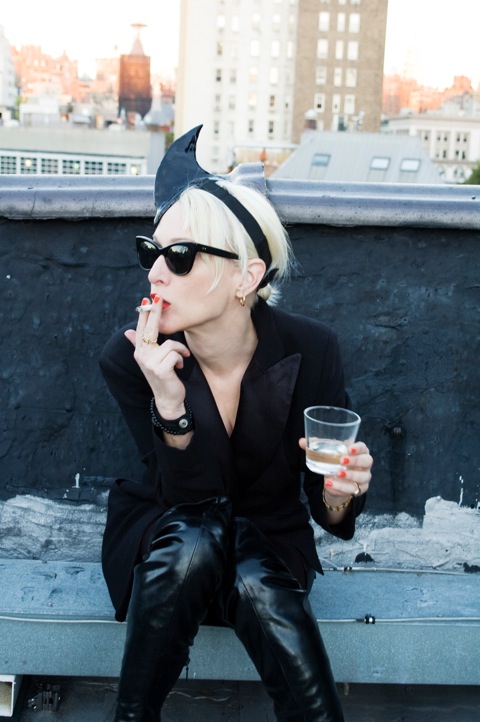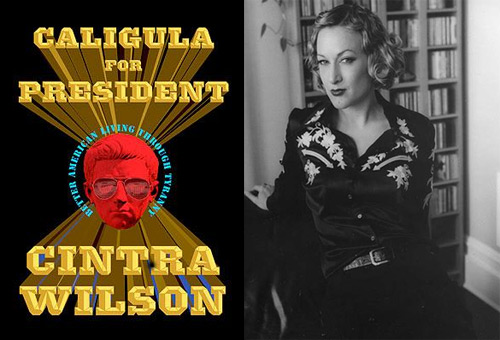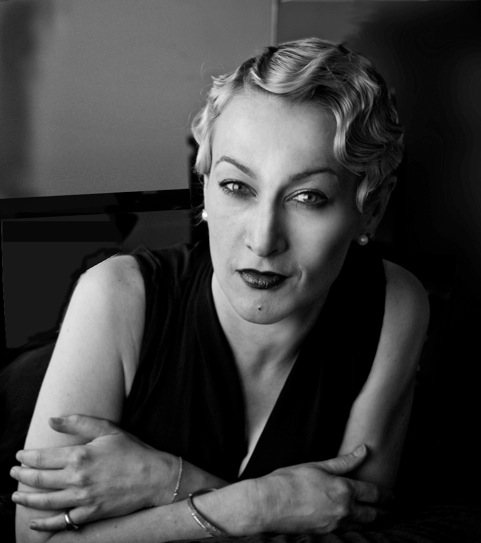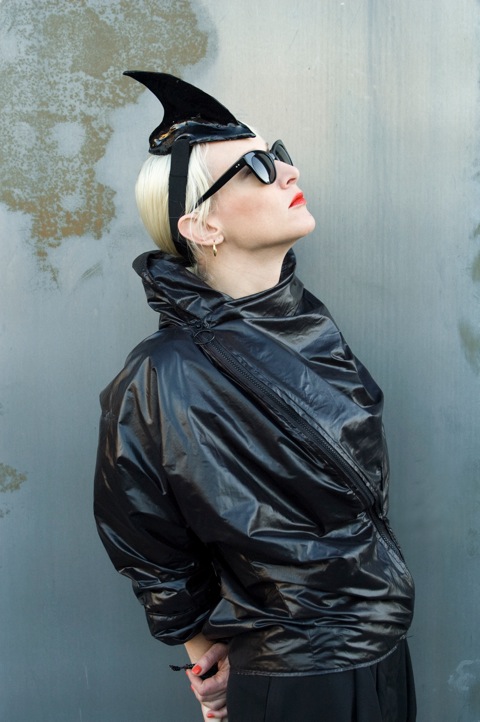
Hiring Cintra Wilson was perhaps the best thing to happen to the NY Times since they added color photography. Wilson's sociological insight and wicked humor transformed the Critical Shopper column into a perverse pleasure even for those with no intention of visiting uptown boutiques or downtown thrift stores. Well goodbye to all that. Wilson's three-year run of acerbic domination ended last week and in certain precincts of the city sadness struck headlong.
Wilson was a known quantity--she's penned novels (Colors Insulting To Nature) and non-fiction (Caligula For President). But she still brought a little danger to The Gray Lady, causing a minor furor with a scathing review of JC Penney's New York outpost. That just made her more endearing to those who devotedly followed her acerbic path.
She's currently working on a book on fashion to be published next year. We spoke recently in Manhattan.

Vice as Virtue: Cintra Wilson in Manhattan. Photo: Sarah Forbes Keough.
Did the end of your run at the Times come as a surprise?
It was a surprise. There's a lot of movement at the Times. It's nothing personal, I'll still be writing features--I'm working on one right now. But they don't want freelancers doing things regularly.
What's it like looking back over three years?
I learned a lot. When I started I didn't know anything about fashion--I actually tried to turn the job down. I said 'I'm not qualified to do this job' and tried to give it to my friend Nancy. They said 'Why don't you try.' It was a genuine discovery. When I wrote the Miu Miu article, the second or third article, you could see me latching onto the idea of fashion. You can see me catching on to what an important language fashion is. It's a language, it's a text through which you can read all kinds of stuff.
How had you looked at fashion before that?
Well, I'd always had my ideas about it. There's a real insider fashion club--what Cathy Horyn does is not something I had any familiarity with. To Anita LeClerc's great credit she wanted an outsider to write something new. I discovered that it was way more than the sum of its parts. Fashion reporting has been extremely intellectually limited. It's an under-explored cultural indicator.
You're working on a book right now.
I'm working on a book about fashion determinism called Fear and Clothing: Unbuckling the Belt Regions to Expose America's Fashion Destiny. I always have really long subtitles.
And remind us what fashion determinism is.
It's my theory that fashion is a magic bullet that enables you to cross cultural boundaries and class lines. You can dress yourself out of who you are and into somebody else, as Madonna has shown us countless times and as Lady Gaga is reiterating as we speak. I do it and I think you do too.
I like that idea.
That's because it's true. I also talk about how regional political economies affect your choices about these things.
What's an example of a regional political economy affecting choices?
Well in the 1940s and '50s, about 15,000 homosexuals were out-processed from the military--they all got kicked out in San Francisco and just stuck around. So there's a reason why all the people ended up there and that's why I was basically raised by drag queens.
Is that why you've got a lot of gay fans?
In my San Francisco playwriting days I was hyper gay-friendly. Most of the men who read my stuff are probably gay. I'm as queer as you can get without sleeping with people of the same sex. But I get things from fifty-year-old straight guys, and seventeen-year-old girls and I don't know who they are.

Photo courtesy of Jerry Bauer.
Is the book a logical extension of what you wrote for the Times?
I was trying to figure out a way to expand what I was doing at the Times. The Critical Shopper has a specific structure to it: it tells you about the shop, what's in it, what the things are, how much they cost, who shops there. There's a structure that's pre-imposed on the article and the structure had this odd effect of making me explode on the inside. A very defined thousand word essay had this counterintuitive effect of blowing my mind.
So it wasn't like a corset.
It was totally liberating. Well, corsets can be liberating as well. But culturally speaking, I was able to take a fashion store and read into it and recall the era and look they were trying to convey. Fashion became interesting as a language about culture. I wasn't the only one doing this, Roland Barthes had done it of course, and others have too.
Do you feel you could convey what you want at the Times?
I had an absolutely exquisite editor, Anita LeClerc, who is a divinity. Once in a while you have a love affair with an editor and they can talk to you perfectly and tell you exactly what they want from you.
And you mentioned that she hired you.
She did--she had read my novel. Anita believed that I could do it, which was quite radical of her. And she really let me play--I've been really lucky in my life to have editors like that. At Salon I had Gary Kamiya and David Talbot.

Photo courtesy of Ken Paprocki.
And what about the JC Penney incident?
That was a big deal. People should have a sense of humor and they should know where I'm coming from--I'm not trying to be harmful. To be fair, the comment I made was about mannequins--not people, mannequins--but it was edgy. I was on the fence about it, and thought 'well, if it's too edgy, my editor will kill it.' I take full responsibility, but I'd already written so much edgy stuff that I thought 'OK the freight train's coming' so many times that, when that one hit it was a surprise. That was the one that finally freaked everybody out? I thought it would have been something else.
Most of the those pieces are about New York City and the boroughs but this was more at the expense of Middle America.
I stumbled blindly into the middle of a class war that was already in progress. I didn't realize was the Times was being perceived by Middle America as out of touch and elitist. Then here's b----y little size-two me, wandering into JC Penney with exactly the same ruthlessness I would bring to Gucci, or any place else. I reviewed them with the same metric that I would review anybody else. What I didn't understand was how this could be taken out of context, how people would not see that article as part of the continuum of the other Critical Shopper articles in which I had already established a snarky voice. They saw it as some New York b---h, s--tting on our thing. It looked b----y, and if you look at it that way I can see how they'd be upset.
And what was the blowback?
The public editor trounced on me, Bill Keller trounced on me. People get upset about JC Penney.
What's your relationship with the pharmaceutical industry?
I'm on a lot of drugs. I have ADD and generalized anxiety disorder, and PTSD and all kinds of things.
Is all this self-diagnosed?
No, I've been in therapy since the dawn of time. But I'm at a good, coasting place. I'm on a sane cocktail of things, and I can keep it together. Mostly.
When you finish a big project do you say 'I don't have to do that for five years' or do you want to do something that reacts against that?
That's an interesting question. I think every long piece you write requires a minimum of three nervous breakdowns. I'm dead serious. Any writer who's actually worth his salt will have multiple nervous breakdowns. It could be because of the isolation, it could be because you're dredging s--t up, something you don't want to know about. You have to get to the point where you can have a walking nervous breakdown.
So when you get the third breakdown you're relieved that it's almost over.
You're telling your brain chemistry 'just hold on, just another month.' Then you can collapse.
So you're not immune to dramatic, intense behavior?
If I denied that I think that every ex-boyfriend I've ever had would set fire to the Huffington Post.
You've worked on screenplays before.
I have. I've been paid a lot of money to do it, but nothing's ever made it to the big screen. I've done a bunch of work for TV. I left LA because it was so hard to get anything that I liked made. I could have gotten things that I didn't like made. But I didn't have any control, and there was just too much money, and too many chefs.
Did you feel like you were just writing kind of generic humor and that you couldn't write in your own voice?
No. I never actually got to that point. I'm not as defensive about it now as I used to be, but for a long time I was really very vigilant about protecting my voice. That was good because I actually ended up with a voice. As opposed to people who sell out and write about lipstick and then they don't know who they are anymore.

Photo courtesy of Sarah Forbes Keough.
You've written that the best clothes inspire fear.
I did say that. It really depends on how you're using clothing. For a long time I used clothing as body armor, I used it as a psychological operation to intimidate my prey.
What does that mean: high heels and black leather?
Not necessarily. If you look really hard and sharp, people are going to straighten up when you walk by. There was something a bit fascistic about my fashion for a while. I was hanging out a lot at my friend's from the Pentagon, and that became interesting to me, for a minute.
There was something fascistic about your impulses?
Somewhat. One thing I talk about in Fear and Clothing is that very iconic image of Condoleezza Rice in a long militaristic coat with a narrow collar, and these really, really high Jimmy Choo boots. It was very Gestapo looking, it was her sartorial interpretation of power. That scene at the end of the movie Elizabeth, when she goes 'alright, f--k it, I'm going to succumb to my destiny and be queen' and she becomes unbeautiful. They stretch her hair back and put on this terrible wig and strap her in to the battle garments of queenliness and she comes out and she's the embodiment of power. She does it through the costume, she does it through the makeup. And it's a signal that she's sending that she's no longer a girl.
And that's a signal that you like to send these days.
No, I'm not doing it right now, but costumes are very fun to experiment with. You get very different results from what that you put on.
What do you think about the state of retail right now?
Everybody feels poor right now. Expensive food writing and expensive clothing writing are fantasy pieces that aren't realistic. We're keeping alive the myth that capitalism is still working, when in fact we've been gutted. Things are closing everywhere and nobody can afford this s--t, unless they're like me at my worst, where say 'f--k it, it's just another credit card.' There's a very small percentage of people who live on the Upper East Side, who can buy these meals and clothes and shoes. I'm not one of them. Most of the people I know aren't these people. They're educated people, they've got PhDs, but they don't have any money.
And your feelings about the state of fashion?
I love fashion--it's a really fluid language. It's an amazing photograph of where we are emotionally, socio-politically, economically. The entire zeitgeist is articulated on the runway in interesting ways. It all means something, and it all adds up to a wonderful piece of art, an abstract articulation of where we are right now.
Do you ever go to fashion shows?
Oh, I've been to a few.
Is it something that amuses you?
It's funny because after the JC Penney article I thought I was persona non grata so I went to Istanbul. I didn't realize it but I was a front row invitee for everything because I had caused a scandal. And I didn't know it so I was in Istanbul and I couldn't go and it was horrible. I'd never been invited to any of that before so I wasn't expecting it. I didn't know it until it was too late. So there are all these invitations and I'm sitting at the Blue Mosque.